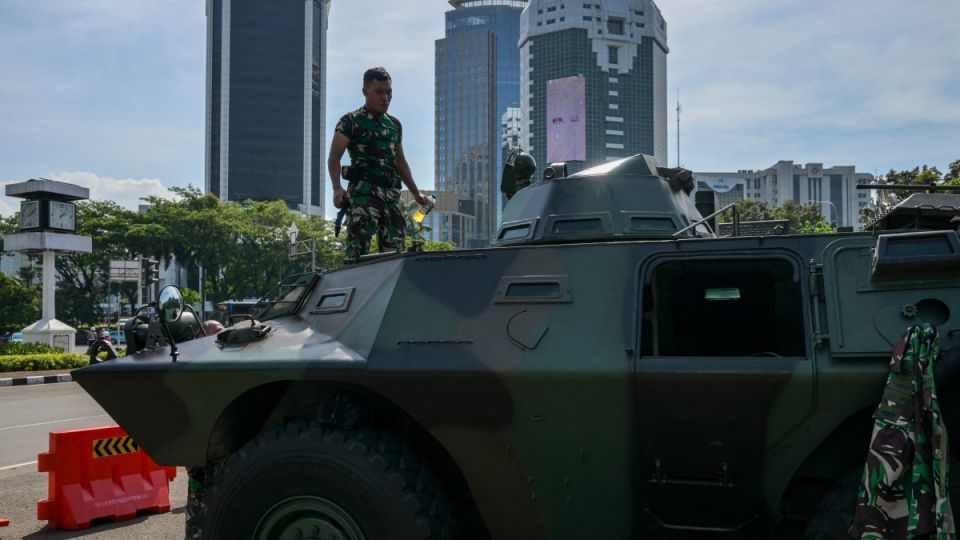September 4, 2025
JAKARTA – The mass deployment of soldiers after a week of unrest that turned deadly over the weekend is robbing academia and civil society of their peace of mind, observers have said, as concerns grow that the involvement of the Indonesian Military (TNI) in restoring public order undermines democratic norms.
Calm has slowly returned to the capital after a week of protests over lawmakers’ conduct and monthly perks, which escalated following last Thursday’s tragic killing of an ojol (online motorcycle transportation) driver by a Jakarta Police Mobile Brigade vehicle.
On Wednesday, Jakarta Governor Pramono Anung lifted the work from home (WFH) policy for civil servants that had been in place since Friday, saying that office activities could resume with the gradual return to normalcy, adding that all transportation services were running as usual.
On the same day, President Prabowo Subianto joined Russian President Vladimir Putin and North Korean leader Kim Jong-un in Beijing to attend China’s 80th Victory Day parade marking the end of World War II, after canceling his trip on Saturday over the widespread protests in Jakarta and other major cities. He returned to Indonesia that evening after meeting with Chinese President Xi Jinping.
The TNI maintained a visible presence on Sept. 3 in the capital, where soldiers patrolled main thoroughfares and armored vehicles were stationed at strategic spots in Central Jakarta, including on the grounds of the National Monument complex, outside the State Palace compound, at ministries and the Harco Glodok trade mall.
The Indonesian Legal Aid Foundation (YLBHI) has called for an end to the troop deployment in Jakarta, as it risked breaching constitutional limits on military involvement in civilian affairs.
“We urge the President, the defense minister and the TNI commander to immediately withdraw the soldiers deployed alongside police in handling public order,” said YLBHI advocacy and networking head Muhamad Isnur.
Al Araf, a senior researcher at human rights monitor Imparsial, has also urged Prabowo to withdraw soldiers from Jakarta and other cities, saying that as conditions had stabilized, the police could handle public safety without military assistance.
He also expressed concern over what he described as a “blank check” given to the TNI due to the lack of regulations on the military’s role in domestic policing, including how long soldiers could be deployed in a nonwar operation.
“There is no urgent situation that justifies this level of military involvement,” Al Araf said, underlining that “the protests stem from public frustration over the government’s failures in delivering social and economic justice”.
Neither TNI spokesperson Brig. Gen. Freddy Ardianzah, Army spokesman Brig. Gen. Wahyu Yudhayana nor Defense Ministry spokesperson Frega Ferdinand Wenas responded to queries from The Jakarta Post on how many troops were deployed in Jakarta and when the military patrols would end.
Several news reports said more than 3,000 Army personnel were deployed in the citywide patrols, even as the TNI conducts joint military exercises with several foreign counterparts in this year’s Super Garuda Shield. At least 500 Army personnel were stationed outside the House of Representatives on Monday alone, Antara reported.
On Saturday during a meeting at his private residence in Hambalang, West Java, President Prabowo ordered National Police chief Gen. Listyo Sigit Prabowo and TNI commander Gen. Agus Subiyanto to take “firm measures” against rioting and looting.
In a speech the following day, Prabowo linked the weekend’s violent unrest to alleged subversion after angry mobs pillaged the homes of several lawmakers and Finance Minister Sri Mulyani Indrawati, as well as vandalized several government buildings.
Defense Minister Sjafrie Sjamsoeddin reiterated this stance on Sunday, saying that the TNI commander and the joint chiefs of staff would assist the National Police in maintaining domestic security and protecting critical infrastructure.
The heavy military presence in Jakarta and other cities since Sunday has triggered a wave of speculation on social media under the hashtag #DaruratMiliter (military emergency), about whether the President was on the brink of declaring martial law.
On Monday, TNI deputy commander Gen. Tandyo Budi Revita dismissed the speculation as “completely false”.
“If there is such an assumption, it is very wrong. It is far from what we are doing,” Tandyo said. He emphasized that the military would only act within the confines of its constitutional role and in following direct orders from the President, particularly on strategic policies.
He added that the National Police was the lead law enforcement institution handling the demonstrations, with the military providing a supporting role if conditions escalated.
“There is no desire to take over. That does not exist. The police are at the forefront and if the situation requires, we [will] act together,” Tandyo said.
In a joint statement on Monday, a group of more than 300 university professors from across the nation expressed their objection to any declaration of martial law, warning that such a move would pave the way for repressive measures against civil society and violate democratic norms.


